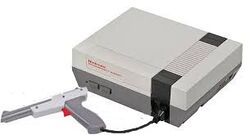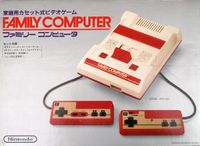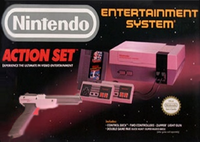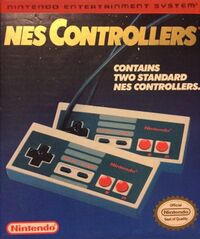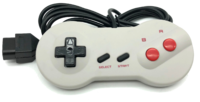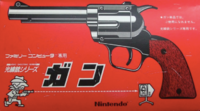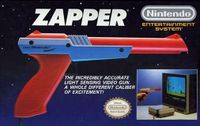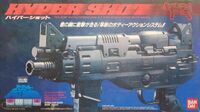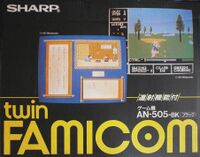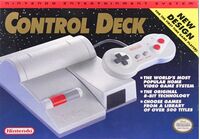Nintendo Entertainment System
 
| |
| Nintendo Entertainment System | |
| Designer | Nintendo R&D2 |
|---|---|
| Manufacturer | Nintendo Mattel (Europe) Samurai Electronics (India) Dendy (CIS) Sharp (Twin Famicom) |
| CPU | 1.79MHz Ricoh 2A03 (1.66 MHz in a PAL NES) |
| Graphics | Ricoh RP2C02 (RP2C07 in a PAL NES) |
| Memory | 2 KB main RAM 2 KB video RAM |
| Media | Game Pak 3-inch floppy disk with Famicom Disk System |
| Released | Family Computer JP: July 15, 1983 Nintendo Entertainment System NA: October 18, 1985 EU: September 1, 1986 Twin Famicom JP: July 1, 1986 Samurai Samurai Electronic TV Game India: 1987 Samurai Micro Genius / IQ-2000: 1990 Dendy Dendy Classic CIS: 1992 Dendy Classic II / Dendy Junior CIS: 1993 NES-101 / AV Family Computer NA: October 1993 JP: December 1, 1993 AU: 1994 |
| Added to Museum | December 25, 1988 (NES) |
The Nintendo Entertainment System was the second home video game console by Nintendo.
It was known as the Family Computer, or Famicom, in Japan.
The Nintendo Entertainment System was preceded by the Color TV-Game series of consoles, which were only released in Japan.
It was first released in Japan in 1983, in North America in 1985, and in Europe in 1986.
The Nintendo Entertainment System was succeeded by the Super Nintendo Entertainment System, which was released in 1991.
Nintendo creates a cartridge-based home console
Nintendo had already sold several video game systems with games built into them in Japan as part of their Color TV-Game line and designed the light guns, based on their Beam Gun line and their Simulation System, which were used in the various shooting games for the Magnavox Odyssey console. Nintendo was also a licensee of the Odyssey and sold the system in Japan.
However, by the early 1980s, consoles that read programmable data on cartridge media were replacing dedicated video game consoles that could only play the games programmed into them. Nintendo Research & Development 2, the development team that had previously designed the Color TV-Game line, went to work designing a system that could read media from a cartridge.
The result was the Family Computer, or Famicom, which came with two built-in controllers, and a microphone embedded in the second controller. It was a hit as soon as it released on July 15, 1983 in Japan. The early success of the console was helped in no small part by Famicom ports of Nintendo's popular arcade games, which were also handled by Nintendo R&D2.
Nintendo enters the North American home console market
By 1983, Nintendo had success in the United States with their arcade games such as Donkey Kong and Mario Bros., and their Game & Watch series. However, they had yet to break into the North American home console market. This was coupled with the fact that the video game crash of 1983 caused retailers to be skeptical of video game systems in North America. After the crash, most economists warned that video games were simply a passing fad. At first Nintendo sought an established parter to get their foot in the door, and approached Atari with an offer to market their Family Computer in the United States. However, Atari declined. Instead, Nintendo renamed the system from the Family Computer to the Nintendo Entertainment System, in order to distance themselves from the consoles that contributed to the crash, and took the risky approach of releasing the system in North America on their own.
They redesigned the system in muted black and grey tones, and made a system that loaded cartridges from the front of the system instead of on top. This was done in an effort to resemble the video cassette recorders of the time, so it would blend into the average American entertainment center. It was released in North America on October 18, 1985, and it became a smash hit. By the early 1990s, it had entered the public consciousness to a level where the name Nintendo became synonymous with video game consoles themselves.
The home video game market rebounds in North America
The Nintendo Entertainment System was the major factor that brought the United States video game market back after the North American video game crash of 1983, helped in no small part by Nintendo's approval policy, and their official seal of quality which was printed on each officially licensed cartridge. This strict policy not only limited the number of games a company could release per year but since Nintendo of America wanted to project a family image, some violent or sexually suggestive games were censored from their original releases. For the most part, though, this system worked in Nintendo's favor, as it prevented the influx of cheaply made games that helped lead to the crash.
Some companies created new branches to get around the game limit. There were also some unlicensed games released on the system that got around Nintendo's protection system, including Atari's games through their Tengen label. Bootleg games and clones of the console were also produced, however, these were more prevalent in Asia and Eastern Europe than in North America. However, the censorship and unlicensed releases did little to hurt Nintendo's profits. The NES remained the best-selling video game console in most of the world for the rest of the decade.
Sales of Nintendo Entertainment System outside of North America
Europe and Oceania
Worldwide markets, outside of most Asian countries, received the same front-loading model as the United States, albeit with power and video output compatible with those in each region.
The Nintendo Entertainment System was released in Europe on September 1, 1986. Spain received a country-specific release that was identical to most other European releases, other than labeling. France also received a release with country-specific labeling, however, this version also has a proprietary connector that outputs audio and SECAM-compatible RGB.
The Nintendo Entertainment System was originally sold in the United Kingdom, Oceania, and Italy by Mattel, so most consoles in those regions contained Mattel branding.
India
In 1987, because of a trade restriction of Japanese goods into India, Samurai Electronics became the official distributor of the Nintendo Entertainment System in Japan. The Samurai Electronic TV Game, a rebranded version of the Asian version of the Nintendo Entertainment System, was assembled in India but the parts were sourced from Nintendo.
In 1990, Samurai Electronics began selling the Samurai Micro Genius. It was a rebranded version of the TXC Micro Genius IQ-501, which was a Famicom clone console with hardwired controllers. Samurai Electronics also sold a Samurai-branded version of the Micro Genius IQ-2000 Famicom clone console with two wireless controllers. These Famicom clone consoles were sold alongside the official version.
Samurai Electronics lost the right to officially distribute Nintendo consoles in 1994 when India's trade restrictions on Japan were lifted. The rights transferred to Active Boeki, the company that was the distributor of Nintendo products at the time in Asian countries other than Japan.
South Korea
Most Asian markets received the Family Computer variation of the system, however, South Korea received the front-loading Nintendo Entertainment System. Like India, it was not sold there directly due to import restrictions on goods from Japan. It was licensed by Hyundai Electronics and released as the Comboy Nintendo Entertainment System in October 1989.
Commonwealth of Independent States
In 1992, Steepler released a Famicom clone imported from Asia named the Dendy in the Commonwealth of Independent States since no official system was released in that region. These Famicom clones, a rebranded version of TXC Corporation's Micro Genius IQ-501, were marketed as the Dendy.
The Dendy was initially a success, but sales soon plateaued, so in 1993 they created a new model called the Dendy Junior, a rebranded version of the Micro Genius MG-02 which resembled the Japanese Famicom but had detachable controllers, and the Dendy Classic II, which was a rebranded version of the Micro Genius IQ-502. The original model continued to be sold as the Dendy Classic. That same year, Dendy sales were expanded into the other territories that were part of the Commonwealth of Independent States.
In August 1994, after Nintendo agreed to make Dendy its official distributor in Russia and the CIS, Steepler and Incombank formed a new company named Dendy.
With this agreement, Dendy had the right to sell the Nintendo Entertainment System in Russia, however, they continued selling the Dendy. The Dendy consoles had become popular in their own right, selling one million units in Russia and the CIS by the start of 1994.
Dendy consoles continued to be sold in Russia and the CIS until the closure of Dendy in 1998.
Family Computer Disk System
Japan received the Family Computer Disk System, an add-on that added a floppy disk to the Famicom, as well as improved sound hardware with simple wavetable support. It was released on February 21, 1986, and although it was a success, it was never released outside of Japan. Some of the games that were originally Famicom Disk games were released as cartridge games, sometimes with altered audio from the original due to the lack of wavetable support in the original console.
Nintendo Entertainment System/Family Computer controllers
NES-004/Family Computer controller
The NES Controller, known as the Family Computer controller or Famicom controller in Japan, was bundled the system.
The original NES-004 model was a rectangular-shaped gamepad that contained two action buttons, a start button, and a select button. It had a cross-shaped directional pad that was designed by Gunpei Yokoi for the Game & Watch systems.
The NES-004 controller was colored grey, dark grey, black, white, and red to match the system colors. Likewise, the Famicom controller was colored gold, black, and red.
The Nintendo Entertainment System had detachable controllers, whereas the original Famicom model had two controllers hardwired to the back of the system.
A microphone was in the second controller of the original Famicom but was not in the NES nor in some later models of the Famicom.
NES-039/HVC-102 controller
The NES controller was redesigned in 1993. The NES-039 model was released in North America on October 1993 and in Australia in 1994. The HVC-102 model was released in Japan on December 1, 1993. The remodeled controllers were ergonomically shaped like a dog-bone. The only difference between the two models was that the HVC-102 controller had shorter cables.
Nintendo Entertainment System/Family Computer lightguns
Beam Gun Series Gun
Shortly after the release of the Family Computer in 1983, Nintendo Research & Development 2 began to develop a light gun and games for use with it. The light gun was named the Beam Gun Series Gun (光線銃シリーズ ガン, Kōsen jū Shirīzu Gan), after Nintendo's successful Beam Gun light gun toy line, was released on February 18, 1984.
Zapper
When the Nintendo light gun was released on the Nintendo Entertainment System in North America in 1985, it was renamed the Zapper. The Famicom Beam Gun resembled a revolver, but due to government restrictions in the United States, the Zapper was redesigned so that it would resemble a ray gun from science fiction. In 1989, due to laws enacted in the United States that required imitation guns to have an orange and light grey design with orange tips to distance them from real guns.
Bandai Hyper Shot
Bandai released a machine gun peripheral for the Famicom titled the Hyper Shot in 1989. The difference between the Beam Gun and the Hyper Shot was that the latter was set up for rapid-fire and that it contained a directional pad. The Hyper Shot was compatible with Beam Gun games, however the built-in directional pad made it so that games designed for it required the Hyper Shot to play.
Additional models of the Nintendo Entertainment System
Twin Famicom
Sharp, one of the companies who had previously released consoles in Nintendo's Color TV-Game line, developed the Twin Famicom.
This was a Famicom and Famicom Disk System combined in one unit. A switch on the unit enabled switching between cartridge and disk modes.
It was released on July 1, 1986 and was only available in Japan.
NES-101/AV Family Computer
The NES-101 model was released in October 1993 in North America and in Australia in 1994. This design update was released as the AV Family Computer in Japan on December 1, 1993. It addressed the problem with dusty and loose contacts of the cartridge connectors in the original Western NES models.
Nintendo remedied this with the NES-101 model system, which loaded games from the top.
It also featured an ergonomic "dog-bone" shaped controller, which was very similar to their then-current console, the Super Nintendo Entertainment System.
Legacy of the Nintendo Entertainment System
The legacy of the Nintendo Entertainment System remains, even after its heyday. Independent, unlicensed games continue to be produced for the system to this day.
Nintendo has capitalized on the system's continuing popularity with emulators to run the games. In 2001, they included NES games in Animal Forest for the Nintendo 64 and in Animal Crossing for the GameCube. In 2003, they released The Legend of Zelda: Collector's Edition for the GameCube with an emulator to play the NES versions of The Legend of Zelda and Zelda II: The Adventure of Link. In 2004, they released emulated versions of several NES titles in the Classic NES Series for Game Boy Advance.
Nintendo introduced the Virtual Console digital download service on the Wii in 2006, which included several emulated NES games. The Virtual Console service was continued on the Wii U in 2011 and on the Nintendo 3DS in 2013.
They also released dedicated consoles that contained modern hardware with an emulator to run the included games. The NES Classic Edition, released as the Nintendo Classic Mini: Nintendo Entertainment System in Europe and Oceania, and as the Nintendo Classic Mini: Family Computer in Japan, was released in 2016, right in the middle of the 1980s nostalgia boom. It featured thirty built-in games, HDMI display output for high definition televisions, and a new replica controller which could also connect to the Wii remote for use on the Wii or the Wii U, the latter of which was Nintendo's current home console at the time. In 2018, Nintendo released a special edition of the miniature Famicom in Japan to commemorate the 50th anniversary of the Weekly Shonen Jump comic, titled the Nintendo Classic Mini: Family Computer - Weekly Shonen Jump 50th Anniversary Version. This version contained 20 games that tied into Weekly Shonen Jump and the mini-console was colored gold.
In 2018, Nintendo released the Nintendo Entertainment System – Nintendo Switch Online service, which contained several NES games which could be played at no additional charge for members of the Nintendo Switch Online service for Nintendo Switch.
NES hardware owned by WEC Museum
| Title | Manufacturer | Release | Notes |
|---|---|---|---|
| Nintendo Entertainment System | Nintendo | 1985 | WEC Museum owns the system and box. |
| NES Controller | Nintendo | 1985 | WEC Museum owns one controller. |
| Zapper light gun | Nintendo | 1985 | WEC Museum owns a grey Zapper. |
